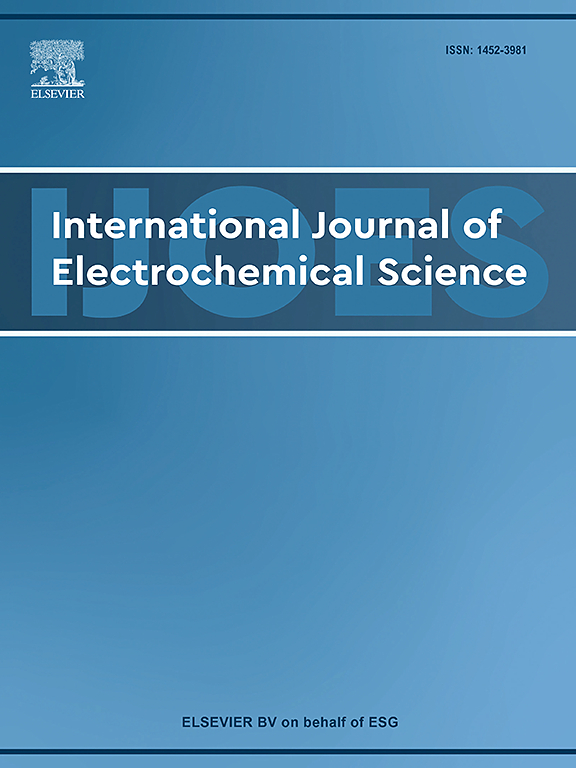Black tea extract as a corrosion inhibitor for X70 steel in chloride media: Experimental and theoretical investigation
IF 2.4
4区 化学
Q4 ELECTROCHEMISTRY
International Journal of Electrochemical Science
Pub Date : 2025-07-28
DOI:10.1016/j.ijoes.2025.101140
引用次数: 0
Abstract
The increased emphasis on sustainability and environmental concerns in metal corrosion is paramount, often achieved through the use of inhibitors, especially by utilizing plant extracts, which is a promising approach due to their availability and ease of extraction. Herein, for the first time, the effectiveness of the black tea inhibitor as a sustainable potent corrosion inhibitor for X70 steel under 3.5 wt% NaCl and 1 M HCl aggressive test solutions is explored, from both experimental and theoretical insights. The corrosion morphology was investigated using atomic force microscopy (AFM), which confirmed the presence of a protective adsorbed layer on the X70 steel surface. By aiding polarization examinations, electrochemical impedance spectroscopy (EIS), and electrochemical current noise analyses, the anti-corrosion capability and the mechanism of the proposed inhibitor were evaluated. The polarization analysis results revealed that in the presence of 200 ppm black tea extract inhibitor, the rates of both cathodic and anodic reactions were significantly decreased, resulting in a reduction in corrosion rate from 0.01 to 0.003 mg/s in NaCl solution and from 0.22 to 0.02 mg/s in HCl medium. Regarding the EIS findings, the most significant inhibition efficiency, approximately 66 %, was achieved after introducing just 200 ppm of black tea extract under the explored corrosive media. Additionally, the density functional theory (DFT) was employed to investigate the electronic properties of the molecules responsible for the inhibitory performance of the as-made black tea inhibitor. Furthermore, a Monte Carlo (MC) simulation and the molecular electrostatic potential (MESP) surface were employed to further comprehend the adsorption mechanism of these molecules on Fe(110) surfaces. The acquired outcomes manifested that the black tea extract possesses significant corrosion inhibition potential for the X70 steel plates.
红茶提取物作为X70钢在氯化物介质中的缓蚀剂:实验和理论研究
越来越重视金属腐蚀的可持续性和环境问题是至关重要的,通常通过使用抑制剂来实现,特别是通过利用植物提取物,这是一种有前途的方法,因为它们的可用性和易于提取。本文首次从实验和理论两方面探讨了红茶缓蚀剂在3.5 wt% NaCl和1 M HCl侵蚀性测试溶液中作为X70钢持久有效缓蚀剂的有效性。利用原子力显微镜(AFM)研究了腐蚀形貌,证实了X70钢表面存在保护吸附层。通过辅助极化检测、电化学阻抗谱(EIS)和电化学电流噪声分析,对缓蚀剂的防腐性能和机理进行了评价。极化分析结果表明,在200 ppm的红茶提取物缓蚀剂存在下,阴极和阳极反应速率均显著降低,腐蚀速率在NaCl溶液中从0.01降至0.003 mg/s,在HCl介质中从0.22降至0.02 mg/s。对于EIS的研究结果,在探索的腐蚀介质中引入200 ppm的红茶提取物后,达到了最显著的抑制效率,约为66 %。此外,利用密度泛函理论(DFT)研究了制备的红茶抑制剂抑制性能的分子的电子性质。利用蒙特卡罗(MC)模拟和分子静电势(MESP)表面进一步了解这些分子在Fe(110)表面的吸附机理。结果表明,红茶提取物对X70钢板具有明显的缓蚀作用。
本文章由计算机程序翻译,如有差异,请以英文原文为准。
求助全文
约1分钟内获得全文
求助全文
来源期刊
CiteScore
3.00
自引率
20.00%
发文量
714
审稿时长
2.6 months
期刊介绍:
International Journal of Electrochemical Science is a peer-reviewed, open access journal that publishes original research articles, short communications as well as review articles in all areas of electrochemistry: Scope - Theoretical and Computational Electrochemistry - Processes on Electrodes - Electroanalytical Chemistry and Sensor Science - Corrosion - Electrochemical Energy Conversion and Storage - Electrochemical Engineering - Coatings - Electrochemical Synthesis - Bioelectrochemistry - Molecular Electrochemistry

 求助内容:
求助内容: 应助结果提醒方式:
应助结果提醒方式:


